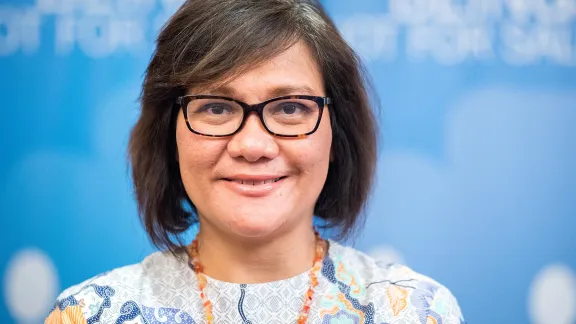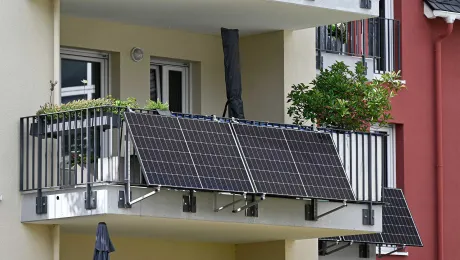
Desri Maria Sumbayak, LWF Vice President for Asia. Photo: LWF/Albin Hillert
Voices from the Communion: Desri Maria Sumbayak, LWF’s Vice President for the Asia region
(LWI) - Desri Maria Sumbayak, from the Indonesian Christian Church (HKI), serves as the Lutheran World Federation (LWF) Vice President for the Asia region. With a passion for gender justice and for raising environmental awareness in the Indonesian churches, she is enthusiastic about implementing LWF’s policies on these issues in her national and regional context.
But this work has also brought its challenges, even before the COVID-19 pandemic which claimed the lives of many Asian leaders, closed down churches and led to a loss of livelihoods for many people across the region.
As a mother of two small children, she talks about her own family background and about her belief in the “priesthood of all believers” which motivates her own ministry
What was your religious life as a child?
I was raised in a religious Lutheran family of the Simalungun Protestant Christian Church in Indonesia where my parents were active elders. I was very familiar with the church activities and festivals. Since I was a young child, we have always had family prayer once a week, together with my parents and my brothers and sisters. As a child and a teenager, I sometimes thought that it was boring to have family prayer during the weekend when my friends were going out and having fun. Now, I realize the truth of what my father often told us: “We need discipline to maintain our faith in Jesus Christ.”
Tell us about your work with the Indonesian Christian Church’s Eco-Theology Team.
For almost three years from 2019 to 2021, I was actively involved in the Indonesian Christian Church Eco-Theology Team. At that time, the team consisted of the project coordinator, two project consultants, and me, a volunteer. The project was supported by the LWF so it gave me an opportunity to learn more about the values of LWF. For example, the involvement of women and youth, interfaith collaboration and ecumenism all had to be considered when making decisions concerning the Eco team. Most importantly, projects of the Eco-Theology team shared LWF’s policy, agreements, advocacy and actions around climate justice.
How has it been to serve on the LWF Council as a laywoman?
For me, it can be quite challenging to serve on the LWF Council as a layperson and also as a woman, so a double minority, so to speak. It is not easy to be Vice-President for the Asia region, where church leaders are predominantly men and a layperson’s leadership in Asian churches is not commonly acknowledged. I feel that I might not understand some of the issues discussed at the table. But as a Lutheran, I believe strongly in the “priesthood of all believers” which promotes equal opportunities to serve God as believers, with or without ordination. So, when God presented me with an opportunity to serve on the LWF Council, I gladly accepted.
I believe that the lay perspective is very valuable to the ministry and work of the LWF. I often think that my perspective may be simple, but I am sincere in my thoughts and my heart. The layperson’s perspective completes the perspective of ordained Council members. I value the LWF highly for always appreciating and listening to the voice of the layperson. However, I am so grateful, that my friends, especially in LUCAS and other church leaders in Asia support my ministry.
What are your previous positions at the church?
I have been actively involved in representing women in the church. I used to be the chair of the women’s organization of our congregation. After that, for several years, I was involved in ecumenical organizations as the representative of the Indonesian Communion of Churches at the province level, and also of the Asia Regional Board in United Evangelical Mission. For the last five years, I was an advisor for national women’s organizations where, I worked with others to make recommendations for the implementation of their programs.
What have you learned in your role as LWF VP for Asia?
I have learned a lot, especially in serving the Lord as a woman and as a layperson in the leadership ministry of the LWF. In the Batak community in Indonesia that I belong to, many still see women as second-class citizens in society. Serving as an LWF Vice-President has enhanced my communications skills in order to communicate LWF’s global policies to the region level, and vice versa, to bring the region’s voice to the global communion. I have learned how to prepare and lead a meeting, how to negotiate, and most invaluably, how to listen to others.
How is the LWF global communion important for the ministry in the Indonesian Christian Church and for the Eco Theology team?
LWF’s global communion is very crucial for the ministry of the Indonesian Christian Church in so many ways. LWF plays an important role in shaping our Lutheran identity, in supporting scholarships, and it also supported our programs during the Covid-19 pandemic.
It was also a great opportunity for HKI to be a pioneer in bringing up the issue of climate justice in Indonesian churches and society. It is a great joy and we are so thankful that the LWF entrusted HKI with an important eco-theology project because climate justice is one of the important issues in the current LWF strategy
LWF/A. Gray
The Lutheran World Federation is a global body that shares the work and love of Christ in the world. In this series, we profile church leaders and staff as they discuss topical issues and set out ideas for building peace and justice in the world, ensuring the churches and communion grow in witness and strength.


